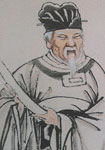“老去深知愧邵平”的意思及全诗出处和翻译赏析
“老去深知愧邵平”全诗
浴沂我欲寻儒服,涉洧公方厌郑声。
试问冶容遨夜市,何如赤脚馌春耕。
故山瓜圃应地恙,老去深知愧邵平。
分类:
作者简介(刘克庄)

刘克庄(1187~1269) 南宋诗人、词人、诗论家。字潜夫,号后村。福建莆田人。宋末文坛领袖,辛派词人的重要代表,词风豪迈慷慨。在江湖诗人中年寿最长,官位最高,成就也最大。晚年致力于辞赋创作,提出了许多革新理论。
《次韵刘帅出郊一首》刘克庄 翻译、赏析和诗意
《次韵刘帅出郊一首》是宋代刘克庄创作的一首诗词。以下是我为您提供的中文译文、诗意和赏析:
诗词的中文译文:
竞逐朱轓载酒行,
熙熙物态与人情。
浴沂我欲寻儒服,
涉洧公方厌郑声。
试问冶容遨夜市,
何如赤脚馌春耕。
故山瓜圃应地恙,
老去深知愧邵平。
诗意:
这首诗描述了诗人刘克庄与友人刘帅一同出郊游玩的情景。他们驾着朱轓(一种四轮马车)相互竞逐,载着美酒行驶,整个行程充满了欢乐和热闹的气氛。周围的景物和人们的情感都显得非常热烈和活跃。诗人在这种欢乐和热闹的氛围中,内心产生了一种渴望,希望能够找到一种质朴的儒雅风尚,与这种热闹不同的宁静。
诗人提到了浴沂,意味着他想要寻找一种儒雅的服饰或者修养,以与热闹的景象形成对比。然而,他发现在洧水边的公道上(涉洧公方),人们已经厌倦了郑声(指热闹喧嚣的声音),并不再追逐这种喧闹。
接下来,诗人试问那些在夜市中游玩的人们,是否愿意放弃这种热闹的娱乐,而选择赤脚耕作春耕。这里的赤脚耕春耕象征着质朴、朴素的生活和劳动。诗人反问,与那些追逐热闹的人相比,这种质朴的生活方式是否更加值得追求。
最后,诗人提到了故山上的瓜圃,暗示自己的年岁已高,并深深地感到惭愧,因为他深知自己与邵平(宋代文学家)相比,还有许多不足之处。
赏析:
这首诗词以欢乐、热闹的郊游为背景,通过对热闹与宁静、繁华与质朴的对比,表达了诗人对于人生追求的思考。诗人在欢乐的氛围中,思索并内心渴望一种更为深沉、内省的生活方式。他试图通过寻找儒雅的服饰和修养,以及赤脚耕作的春耕,来寻求一种与热闹不同的宁静和朴素。然而,他也意识到自己的年岁已高,与邵平相比,仍有许多不足之处。
这首诗词通过对热闹与宁静、繁华与质朴的描绘,反映了诗人对于人生价值和生活方式的思考。同时,诗人对于自己的年岁和不足之处的自省,也展示了他的内心深处的情感和成熟的思Here is an analysis of the poem you provided:
Title: "A Response to Liu Shuai's Outing"
Dynasty: Song Dynasty
Author: Liu Kezhuang
Content:
竞逐朱轓载酒行 (Competing in racing the red carriage, loaded with wine),
熙熙物态与人情 (Bustling with lively scenes and human emotions).
浴沂我欲寻儒服 (In Yuyi, I desire to seek refined clothing),
涉洧公方厌郑声 (Crossing the Wei River, officials are tired of the clamor of Zheng).
试问冶容遨夜市 (I ask about the beauty who roams the night market),
何如赤脚馌春耕 (How about embracing barefoot farming in spring)?
故山瓜圃应地恙 (The melon field of my old mountain is affected by the land's illness),
老去深知愧邵平 (Growing old, I deeply feel ashamed compared to Shao Ping).
Poetic Meaning and Appreciation:
The poem "A Response to Liu Shuai's Outing" depicts the poet Liu Kezhuang's experience of going on an outing with his friend Liu Shuai. They engage in a lively race, riding a red carriage and carrying wine. The journey is filled with joyful and bustling scenes, reflecting the liveliness of the surroundings and the emotions of the people.
In this vibrant and lively atmosphere, the poet desires to find a refined and cultured attire or demeanor that contrasts with the excitement. The mention of Yuyi indicates his longing for a refined clothing style or refinement in general, seeking a peaceful and serene contrast to the liveliness.
However, he discovers that officials on the banks of the Wei River (Wei Watercourse) are tired of the clamor and noise associated with the city of Zheng. This suggests that they have grown weary of the bustling and noisy atmosphere and are no longer interested in pursuing it.
The poet then poses a question to a beautiful woman who wanders through the night market, asking her if she would prefer the simple and humble act of barefoot farming in spring over the excitement of the market. This comparison symbolizes the choice between a simple and down-to-earth lifestyle and the pursuit of temporary pleasures.
Lastly, the poet mentions his old mountain's melon field, indicating his advanced age and a sense of regret and self-reflection. He feels a deep sense of shame when comparing himself to Shao Ping, a literary figure from the Song Dynasty, recognizing his own shortcomings.
This poem juxtaposes liveliness with tranquility, prosperity with simplicity, reflecting the poet's contemplation of the pursuit of life's values and lifestyle choices. The poet's self-reflection on his age and shortcomings reveals his inner emotions and mature thinking, highlighting the depth of his sentiment and contemplation.
“老去深知愧邵平”全诗拼音读音对照参考
cì yùn liú shuài chū jiāo yī shǒu
次韵刘帅出郊一首
jìng zhú zhū fān zài jiǔ xíng, xī xī wù tài yú rén qíng.
竞逐朱轓载酒行,熙熙物态与人情。
yù yí wǒ yù xún rú fú, shè wěi gōng fāng yàn zhèng shēng.
浴沂我欲寻儒服,涉洧公方厌郑声。
shì wèn yě róng áo yè shì, hé rú chì jiǎo yè chūn gēng.
试问冶容遨夜市,何如赤脚馌春耕。
gù shān guā pǔ yīng dì yàng, lǎo qù shēn zhì kuì shào píng.
故山瓜圃应地恙,老去深知愧邵平。
“老去深知愧邵平”平仄韵脚
平仄:仄仄平仄仄仄平
韵脚:(平韵) 下平八庚 * 平仄拼音来自网络,仅供参考;诗句韵脚有多个的时候,对比全诗即可判断。